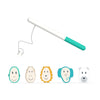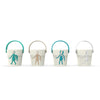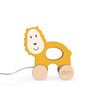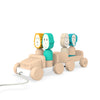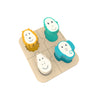The Dos and Don’ts of Toddlers’ Bedtime Routines
Some nights I’ll find myself skipping out of my sleeping toddler’s bedroom thinking I’ve cracked it, only to find myself 24 hours later locked in a bedtime battle. Getting your little one to sleep can sometimes be a struggle, so is there an easier way to send your toddler off to the land of nod, where they’ll stay for at least 12 hours? We’ve compiled a handy list of dos and don’ts to help you get the peace and quiet you deserve at the end of the day.
Do establish a regular routine
After months of sleepless nights with her toddler, a friend sought the help of a sleep coach. Her pearl of wisdom was that to establish a routine, every bedtime should be approached in exactly the same way. And she meant exactly. We’re not just talking bath, play, milk, bed; we’re talking bath with the same toys every night, playing the same game, singing the exact same song, and reading exactly the same book. While it may seem tedious at first, it’s apparently a great way to trigger the cues of nighttime sleeping, and once it starts working for your little one, you can start introducing new elements.
Do snuggle up at story time
Not only is reading a book at bedtime a great way to encourage your child’s imagination to flourish, but snuggling together will release oxytocin in your toddler’s brain, which can help them feel sleepy. Listening to the story also engages their frontal lobes, the part that stops movement impulses, so they’re less likely to jump out of bed.
Do keep an eye on daytime sleep
Think about how many ZZZs your toddler has had in the daytime. Experts agree that 9 to 15-month-olds still need two naps a day, totalling two to three hours, while 15 to 36-month-olds still need one nap a day. Any more than this and they won’t be feeling particularly tired, and any less then you’ll have an overtired toddler who is too wound up to sleep (the worst kind).

Do create a safe, cosy atmosphere
One of the most important things to do for your toddler at bedtime is to bring them down from a super alert state, helping kick start the calming hormones in the brain that lead to sleep. Creating a soothing environment is key to a smooth bedtime, so think calming music, dim lights and warm soft blankets. I find that wave sounds, classical music, or white noise can help – but definitely steer clear of the Baby Shark song.
Don’t reach for the remote
It may seem like a no-brainer, but it’s important to limit screen time to an absolute minimum before bed. That means no phones, no iPads and no TV, even if In the Night Garden is on. Blue light from screens can limit the release of the sleep-inducing hormone melatonin, as well as increasing alertness. Something you definitely don’t want at bedtime.
Don’t give your toddler these foods
Protein, such as meat and fish are a bad idea before bedtime, as they release the stimulating hormone dopamine. Stay away from chocolate too, as it contains caffeine. If your toddler is hungry, bananas are a great way to tide them over until breakfast, as they release hormones that help bring on sleep.

Don’t get too disheartened
If you’re trying everything, and nothing seems to be working don’t fret. Our little people are complicated beings, and often find themselves in growth or developmental stages that make it harder for them to settle at night. Throw into the mix teething, illness and unavoidable changes to their routine, and you’re bound to experience a fair share of the bedtime blues. When frustration starts to kick in, take a step back, breathe deeply. If you’re stressed, tense, irritated or angry, you can trigger the same responses in your toddler’s brain, making them more alert, less at ease and far less likely to drift off. When it gets too much, try to remind yourself that this nighttime upheaval is for a short pervious of your life, and it will get better. We promise!
Do you have any tips for getting your toddlers to sleep? We’d love to hear them, tag us on Twitter or Instagram @...













